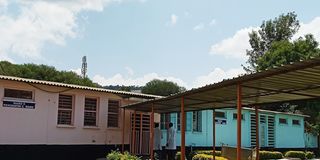Health on Trial: The depressing state of Nakuru's mental health facility

The psychiatric ward at Nakuru Teaching and Referral hospital.
The psychiatric ward at Nakuru Teaching and Referral Hospital has left a sour taste in Patricia Mwikali's* mouth.
Her daughter has been a patient at the facility since 2018, after being diagnosed with severe depression.
Mwikali however conveys dissatisfaction with the services at the facility, citing sharing of beds as an issue her daughter has to grapple with.
“As a mother, this is very concerning. How can two mentally unstable patients be made to share a bed? What if they harm each other? Will the hospital take responsibility if any harm befalls my child?” the distressed mother asks.
She additionally adds that most of the drugs prescribed to her daughter are not found within the hospital’s chemist forcing her to buy them outside at exorbitant prices.
“The only reason my daughter is still a patient here is due to lack of financial capability to transfer her to a private institution, where I feel she would be better cared for,” she laments.
An inside source reveals that at times patients are forced to share beds, with some even sleeping on the cold floors.
This disturbing information is confirmed by the deputy nurse-in-charge, Nyauche Otieno, who highlights further challenges at the psychiatric ward.
“Funding is the biggest issue. Money is indeed allocated for mental health by the national government, but it is not enough to help us meet all the needs at this facility,” Mr Otieno says.
He further uncovers the loud demand for more medical staff saying currently there are nine staff with only seven having been trained on mental health.
“Ideally, the facility needs 18 to 20 trained staff.”
Mr Otieno additionally explains that understaffing ends up affecting the ability to keep tabs on discharged clients, as the medical personnel focus on patients at the facility.
Upon reaching out to Nakuru Teaching and Referral medical superintendent Dr. James Waweru, he noted that a new unit was opened a year ago which doubled up the capacity from 25 to 65 patients.

Nakuru Teaching and Referral hospital Medical superintendent Dr James Waweru.
“Space is still an issue due to patients who are abandoned at the facility by family members," he says.
On the lack of drugs within the hospital chemists, Dr Waweru admits that this is true adding that nothing can be done to change this.
“For the drug issue, that can’t really be helped since the hospital only stocks the essential drugs. For those that are specialized, the patients’ families have no option but to go pick them up in other facilities, mostly in Nairobi,” Dr. Waweru closes off.
Some of these challenges are also experienced at Gilgil Psychiatric Hospital, with the biggest hurdles being overcrowding, archaic infrastructure and inadequate funding.
Asked to comment on these issues facing the biggest psychiatric facility in Rift Valley, the Gilgil Sub-County medical superintendent Dr. David Kuria refused to comment.
While asked on the County's position in aiding the dire situation at Gilgil Psychiatric Hospital the Chief Officer for Health, Dr. John Murima notes, "The national government was supposed to take over management of the institution and even rehabilitate the facility. However, there is no documentation to prove the planned takeover."
